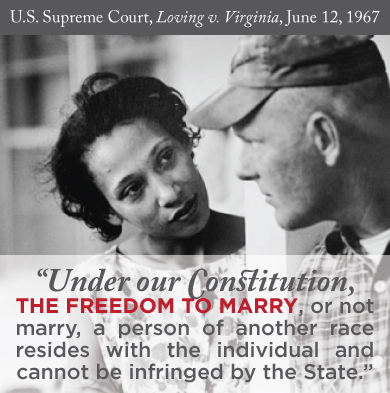Marriage News Blog
They dared to love each other when the law said it was illegal.
In 1958, Mildred Jeter, a woman of African-American and Native-American decent, married Richard Loving, a white man. They were thrown in prison.
Believing that the United States Constitution guaranteed them the fundamental freedom to marry, they filed a lawsuit. That watershed case,┬ĀLoving v. Virginia, was decided by the Supreme Court 46 years ago today.┬Ā The unanimous Court said:
ŌĆ£Marriage is one of the ŌĆ£basic civil rights of man,ŌĆØ fundamental to our very existence and survival. ŌĆ” Under our Constitution, the freedom to marry, or not marry, a person of another race resides with the individual and cannot be infringed by the State.ŌĆØ
Before she died, Mildred Loving wrote a heart-felt letter about how their historic case plays an important role todayŌĆöin securing marriage for gay and lesbian couples:
ŌĆ£ŌĆ” I am proud that Richard’s and my name is on a court case that can help reinforce the love, the commitment, the fairness, and the family that so many people, black or white, young or old, gay or straight seek in life. I support the freedom to marry for all. That’s what Loving [v. Virginia], and loving [each other], are all about.ŌĆØ
The Loving decision is indeed one of 14 key precedents in AFERŌĆÖs case against Prop. 8.
At the time,┬Ā20% of Americans believed it was okay to marry someone from a different race. Far different from the┬Āover 30 polls that have shown majority support for marriage equality.
Previously, AFER attorneys┬ĀTed Olson and David Boies recorded a short video┬Āto mark the caseŌĆÖs importance on AFERŌĆÖs federal challenge to Prop. 8 (above).
The LovingŌĆÖs quest for equality was also told in the moving documentary┬ĀThe Loving Story.


